
Akasa Galileo Review
Manufacturer: AkasaUK price (as reviewed): £84.95 (inc VAT) (including power adaptor)
US price (as reviewed): $119.99 (ex Tax)
Formally unveiled recently at the Computex tradeshow in Taiwan, Akasa's new fanless cases, which continue to be named after famous physicists, take advantage of several new motherboard genres. The first is the Newton, which offers a home to Intel's NUC motherboards, which retails for a reasonable £40. The second is a new fanless mini-ITX case, designed for slim-type mini-ITX motherboards, called the Galileo. Following on from the similar Euler we looked at recently, the Galileo is a slightly longer, more expensive case, which is designed from the ground up to be as skinny as possible.
This drive for slenderness has its issues though. Barely taller than the Intel BOXDQ77KB slim motherboard we used for testing, the Galileo has to employ a complicated cooling system. Where the Euler's CPU to case heat transfer was simple, with the case itself clamping onto the CPU, the Galileo has a considerably more involved heatpipe system. But we'll talk more on that later.
Click to enlarge
As we saw with the Euler, build quality is superb, and Akasa certainly hasn't spared any aluminium with the Galileo. At a glance you'd be forgiven for mistaking it for a solid lump of the stuff. However the left section sports a large array of fins for that all important passive heat dispersion.
Click to enlarge
Covered all over with a black anodised finish and held together by flush-fitting screws, it's perhaps a little bland-looking, with just a power button and the usual front panel lights giving away its true purpose, but when the finish is of such high quality you won't hear us complaining.
The Galileo also has VESA mounts and as you may have seen in Computex coverage, it's designed to be mounted behind your monitor or in small gaps between billboards or desks - anywhere you need a PC to be hidden basically. There's clearly no room for an internal PSU so, like the Euler, the Galileo comes with a 120W external power adaptor that connects straight to compatible slim-type motherboards.
Click to enlarge
As we found with the Euler, it's a shame there are no front or side USB ports because it's a brilliant candidate for an HTPC. As such you'll have to settle with your motherboard's ports, perhaps throwing in a USB hub or card reader as you need it. Unlike the Euler, though, you'll also be limited to using mSATA SSDs as there are no 2.5in mounts here due to the extremely small interior. It goes without saying that there's no option for expansion cards either.
Click to enlarge
With no direct case to CPU cooling mechanism, Akasa has opted for a similar method to that used by the Streacom ST-FC5S, using heatpipes to transfer the heat from a CPU block to the case. It's undeniably more fiddly and complicated compared to the Euler, which we built in a matter of minutes. The Galileo will likely take a good half hour, and see your fingers covered in a delightful shade of thermal paste by the end of it too.
Click to enlarge
The radiator section is essentially built in two parts, with small groves in between that sandwich the heatpipes. Once bolted back together, you get the feeling the case could survive a fall from a ten storey building it's so solid - something that bodes well for the Galileo in more industrial applications as well as being slung on the back of a monitor in your average office.
Specifications
- Dimensions (mm) 307mm x 190mm x 37mm 1 (W x D x H)
- Material Aluminium
- Available colours Black
- Weight 1.7kg
- Front panel none
- Drive bays none (mSATA SSDs only)
- Form factor(s) Slim mini-ITX
- Cooling passive radiator (CPU)
- Extras VESA mounting pins, thermal paste, 120W external power adaptor

MSI MPG Velox 100R Chassis Review
October 14 2021 | 15:04

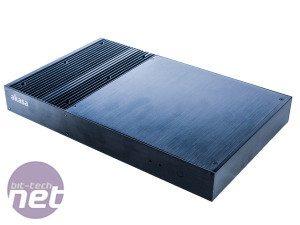
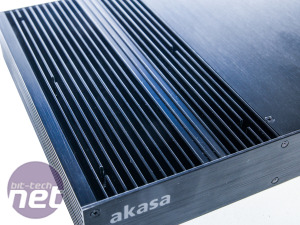
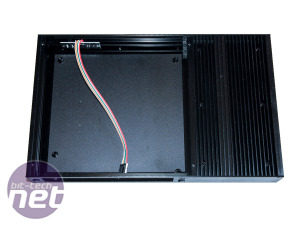
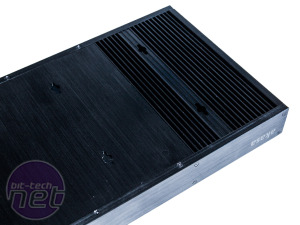
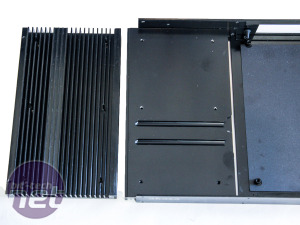
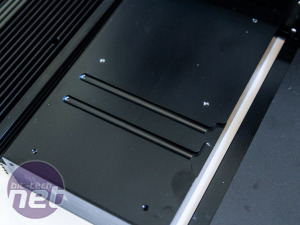
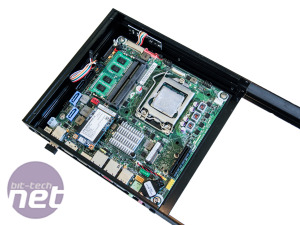
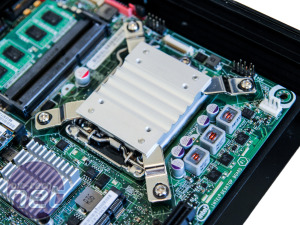
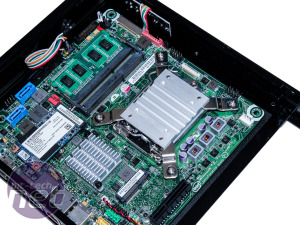
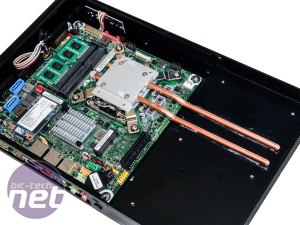







Want to comment? Please log in.